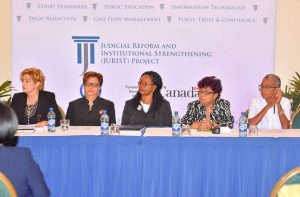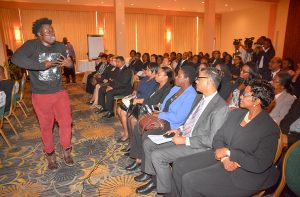 Guyana’s Criminal Justice System is better equipped to adjudicate sexual offence cases now that the country has adopted the Model Guidelines for Sexual Offence Cases in the Caribbean Region – an initiative being rolled out under the Canadian funded Judicial Reform and Institutional Strengthening (JURIST) Project.
Guyana’s Criminal Justice System is better equipped to adjudicate sexual offence cases now that the country has adopted the Model Guidelines for Sexual Offence Cases in the Caribbean Region – an initiative being rolled out under the Canadian funded Judicial Reform and Institutional Strengthening (JURIST) Project.
The model guidelines, launched at the Pegasus Hotel in the presence of distinguished members of the judiciary–local and international, ministers of government and officials from the security sector, are intended to ensure that re-victimisation of survivors is minimised.
Social Protection Minister, Amna Ally; Public Health Minister, Volda Lawrence; Chancellor of  the Judiciary (ag), Yonette Cummings-Edwards; High Commissioner of Canada to Guyana, Lilian Chatterjee; High Court Judge, Justice Navindra Singh; Judge of the Caribbean Court of Justice and Chair of the Sexual Offences Advisory Committee, Maureen Rajnauth-Lee; JURIST Project Director, Dr. Penny Reedie; and Director of Red Thread, Karen De Souza were among the officials present to witness the ground-breaking event.
the Judiciary (ag), Yonette Cummings-Edwards; High Commissioner of Canada to Guyana, Lilian Chatterjee; High Court Judge, Justice Navindra Singh; Judge of the Caribbean Court of Justice and Chair of the Sexual Offences Advisory Committee, Maureen Rajnauth-Lee; JURIST Project Director, Dr. Penny Reedie; and Director of Red Thread, Karen De Souza were among the officials present to witness the ground-breaking event.
Stating that Guyana fully embraces the model guidelines, Justice Cummings-Edwards explained that the are intended to provide internationally accepted best practices for the management of sexual offence cases. “We know that sexual violence in the Caribbean is a big problem. We know too that there is under-reporting of many cases involving sexual assaults and for those few cases that have been reported, the complaint is, and justifiably so, that they have not been handled very well at times, be it at the investigative stage, (or) the trial stage,” Justice Cummings-Edwards noted.
She also took note of the fact that some persons are afraid to report cases of sexual assault and even to testify in court, and for those who are brave enough to testify, they are sometimes re-victimised and traumatised. The chancellor said while there have been improvements in the Justice System response, more needs to be done, and the guidelines would aid in filling the gaps. “I think more can be done, and these guidelines would provide guidance to us within the Justice Sector, all stakeholders involved in the reporting, in the investigation, prosecution, and the adjudication of sexual offences,” the Chancellor told the audience.
The launch of the Model Guidelines for Sexual Offence Cases on Monday coincided with the opening of Guyana’s first Sexual Offences Court, and according to Justice Cummings-Edwards, the guidelines will provide the necessary requirements needed for the management of the court. “We are confident that the prosecution and adjudication of these sexual offence cases will take on a new level…These cases will see our witnesses/victims being able to give their evidence in court and seeing them having the support prior to and after giving their evidence and it will see an adjudication of cases at a different level,” the Chancellor assured.
Safeguarding rights
Social Protection Minister, Amna Ally, in making her contribution, said the guidelines will complement the work being done to safeguard the rights of survivors of sexual and domestic violence. Minister Ally pointed out that the country is in the process of conducting a comprehensive review of its National Plan of Action for the implementation of the Sexual Offences Act and Domestic Violence Act. It has also reinitiated the resuscitation of the Task Force for the Prevention of Sexual Violence. “This inter agency task force will have specific responsibilities for the development and implementation of a national plan of action for the prevention of sexual violence,” she explained.
Significant emphasis, she added, is being placed on improving the quality of care and services being provided to victims and survivors of sexual violence. As such, protocols for medical practitioners, prosecutors and police officers have been developed and endorsed by the respective ministerial heads.
Implementation of these ministerial protocols aims to strengthen the country’s national commitment towards the process of strategic and purposeful alliances that would result in the reduction and ultimately the elimination of sexual violence. Guyana, Minister Ally said, is pleased to adopt the model guidelines. “We will work to bring all perpetrators to justice; we will ensure that institutions are held accountable and effective support systems are in place for victims. The Government is fully committed to the implementation of these guidelines so that we can ensure increase public confidence in the justice system as it relates to the handling of sexual assault cases,” the Social Protection Minister assured.
Ground-breaking document
CCJ Judge and Chair of the Sexual Offences Advisory Committee, Justice Maureen Rajnauth-Lee said she was pleased to be a part of a process that led to the development of the ground-breaking document. It was noted that the model guidelines were developed after a series of consultations with Justice Sector Stakeholders in several CARICOM countries. Discussions were also held with survivors, persons with disabilities and persons of indigenous populations.
The JURIST Project is a five-year regional Caribbean judicial reform initiative funded under an arrangement with the Government of Canada. The project is being implemented on behalf of Global Affairs Canada and the Conference of Heads of Judiciary of CARICOM by the Caribbean Court of Justice (CCJ).
In May, 2015 the project established an advisory committee consisting of representatives from the CCJ, judiciaries of Trinidad and Tobago, Jamaica and Barbados, UN Women, UNICEF, CARICOM Secretariat and UWI (Jamaica) to monitor the implementation of the initiative. A baseline study was commissioned through UN Women on the legislation, protocols and court systems for sexual offence cases conducted in five CARICOM Countries.
Courtesy: guyanachronicle.com






